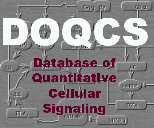
|
Enter a Search String | | Special character and space not allowed in the query term.
Search string should be at least 2 characters long. |
Molecule Parameter List for CaM | The statistics table lists the distribution of a molecule acting either as a substrate, product, enzyme or as a molecule within the network.
The text color of a molecule is highlighted by  color. color. | | Statistics |
Accession and Pathway Details | |
CaM acting as a Molecule in CaMKII_2003 Network
| Name | Accession Name | Pathway Name | Initial Conc.
(uM) | Volume
(fL) | Buffered | | CaM | CaMKII_2003
Accession No. : 49 | CaM
Pathway No. : 203 | 20 | 1000 | No | | There is a LOT of this in the cell: upto 1% of total protein mass. (Alberts et al) Say 25 uM. Meyer et al Science 256 1199-1202 1992 refer to studies saying it is comparable to CaMK levels. |
CaM acting as a Product of an Enzyme in CaMKII_2003 Network
Enzyme Molecule /
Enzyme Activity | Accession Name | Pathway Name | Km (uM) | kcat (s^-1) | Ratio | Enzyme Type | Reagents | PKC-active /
PKC-phosph-ng-Ca
M
| CaMKII_2003
Accession No. : 49 | Shared_Object_
CaMKII_2003
Pathway No. : 201 | 28.5948 | 0.35 | 4 | explicit E-S complex | Substrate
neurogranin-CaM
Product
CaM
neurogranin*
| | Rates are 60% those of PKC-phosph-neurogranin. See Huang et al ABB 305:2 570-580 1993 |
CaM acting as a Substrate in a reaction in CaMKII_2003 Network
| Kd is calculated only for second order reactions, like nA+nB <->nC or nA<->nC+nD, where n is number and A,B,C,D are molecules, where as for first order reactions Keq is calculated.
Kd for higher order reaction are not consider. |
| | Name | Accession Name | Pathway Name | Kf | Kb | Kd | tau | Reagents | | 1 | CaM-TR2-bind-Ca | CaMKII_2003
Accession No. : 49 | CaM
Pathway No. : 203 | 72
(uM^-2 s^-1) | 72
(s^-1) | Kd(af) = 1(uM) | - | Substrate
Ca
Ca
CaM
Product
CaM-TR2-Ca2
| | | Lets use the fast rate consts here. Since the rates are so different, I am not sure whether the order is relevant. These correspond to the TR2C fragment. We use the Martin et al rates here, plus the Drabicowski binding consts. All are scaled by 3X to cell temp. kf = 2e-10 kb = 72 Stemmer & Klee: K1=.9, K2=1.1. Assume 1.0uM for both. kb/kf=3.6e11. If kb=72, kf = 2e-10 (Exactly the same !).... | | 2 | neurogranin-bind
-CaM | CaMKII_2003
Accession No. : 49 | CaM
Pathway No. : 203 | 0.3
(uM^-1 s^-1) | 1
(s^-1) | Kd(bf) = 3.3333(uM) | - | Substrate
CaM
neurogranin
Product
neurogranin-CaM
| | | Surprisingly, no direct info on rates from neurogranin at this time. These rates are based on GAP-43 binding studies. As GAP-43 and neurogranin share near identity in the CaM/PKC binding regions, and also similarity in phosph and dephosph rates, I am borrowing GAP-43 kinetic info. See Alexander et al JBC 262:13 6108-6113 1987 |
| Database compilation and code copyright (C) 2022, Upinder S. Bhalla and NCBS/TIFR
This Copyright is applied to ensure that the contents of this database remain freely available. Please see FAQ for details. |
|
